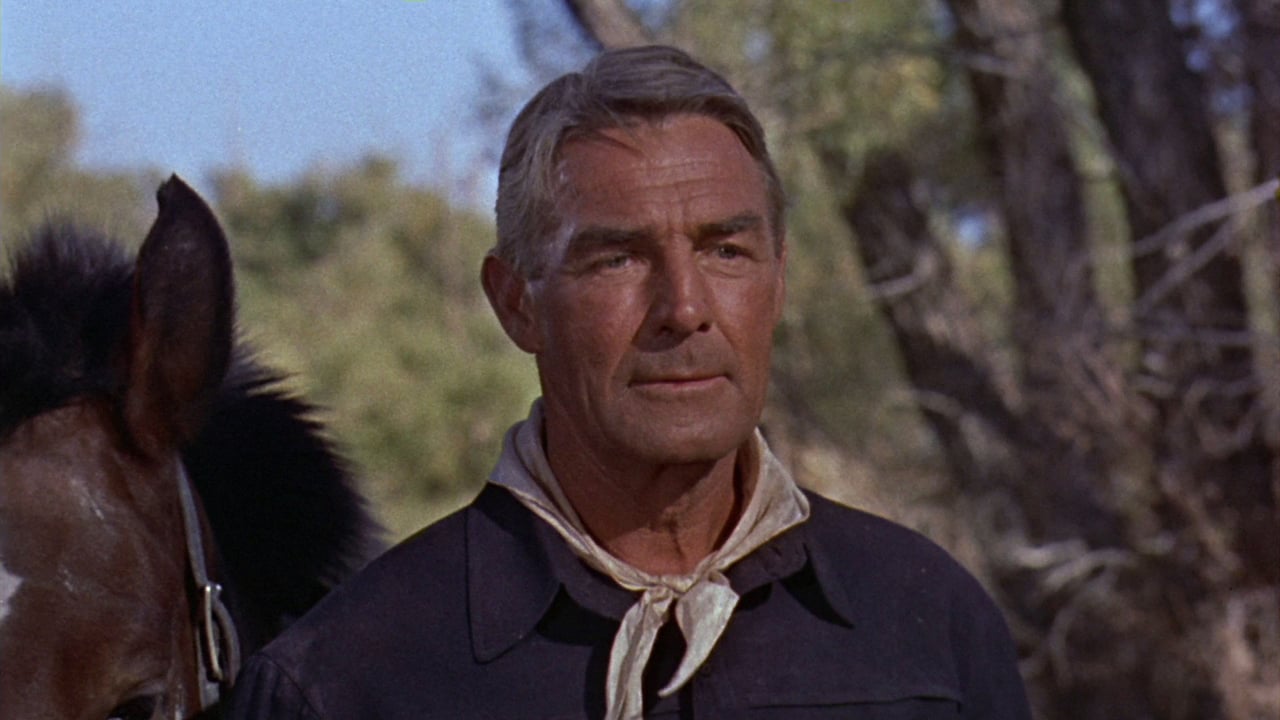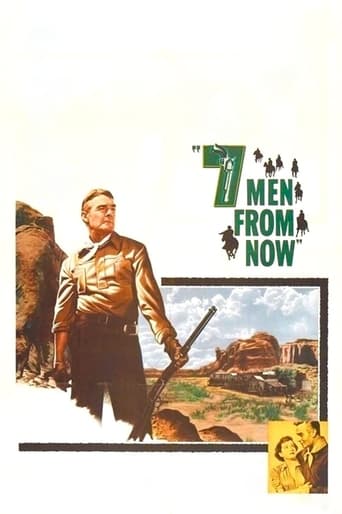

I'm going to jump right into my criteria for watching any movie:1. Do I believe the story? Not really, kinda, maybe, if I'm suspending disbelief as I do for animation, perhaps? So many unbelievable elements to it -- the token Indian threat; screaming Hollywood from the Joshua Tree National Park (or nearby) in the first 5 minutes; one minute we're in the desert, next minute we're in a torrential downpour, and more. The whole setup was so rigged, I actually found myself paying close attention to sunlight & shadows on the cardboard characters' faces. Questions such as: How can that guy see in the desert with the sun in his eyes? Are they really travelling south, based on which way the shadows are cast?2. Do I care about the story?No way! I don't think I had ever seen a Randolph Scott movie before, unless in childhood. But that song has been with me all my life, "Whatever happened to Randolph Scott, ridin' them trails alone?..." So I figured I'd check out Randolph Scott hunting down 7 bad guys, just for a look. Otherwise, I wouldn't have lasted more than 15-20 minutes. By the end of the film, I didn't really care how things turned out. Without spoiling, I will say I was mostly engaged in predicting what would happen (as opposed to simply watching what happened) -- I got 100% of my predictions right!3. Do I believe the characters?Not really, with one exception: Lee Marvin's character, Masters. I hated him -- and since he was the villain, that's exactly the way I was supposed to feel about him. A nasty old scoundrel from the Wild West. Yep, I believed Lee Marvin!4. Do I care about the characters?No. I wanted to care about Randolph Scott, 'cause he does seem like a cool dude type, right from the start, and his mission was righteous. Naturally, Mrs. Greer is pleasing to the eye, and Gail Russell did the job she was hired to do, but nothing more. On a positive note, I did care about Lee Marvin's Masters. He was the villain, and I was rooting against him, as I was supposed to. A pretty straightforward villain, but very well played, nonetheless.Overall, I'm disappointed, with the exception of Lee Marvin's performance -- the only reason I scored this movie 4/10 and not lower. I strongly disagree with the 7.5 out of 10 rating which enabled me to watch the movie. I believe that average rating to be exaggerated sentimentalism. Indeed, even I began by giving this movie 6 out of 10 -- but realized I had done so for two reasons: (1) I almost felt duty-bound not to give it a lower rating, given its status as a "classic western"; and (2) I know IMDb applies a weight to ratings -- which works in the case of Bollywood and such -- but I honestly felt that giving "Seven Men From Now" the rating I truly felt would somehow diminish the value of my vote. The more I think about it -- even the title is contrived. Most or all negative connotations of "Hollywood" as being a contrived industrial production of cinema as opposed to art, are present in this movie, with the exception of Lee Marvin's performance.My recommendation: Don't waste your time with this one!
... View MoreYou'd be safe calling this one of your better underrated Westerns. Randolph Scott of course is always solid, but what I liked about this picture was the way it took it's time to reveal Ben Stride's back story, leaving the character somewhat ambiguous following the opening scene when he gunned down two of the Wells Fargo bandits. The story line also dangled the character of John Greer (Walter Reed) as a question mark, as we learn about his role concerning the gold heist via the brains behind the robbery. This was all quite cleverly written, with the added twist of a possible romantic angle between Stride and Annie Greer (Gail Russell).There's something to be said about that romantic angle. Director Budd Boetticher uses an interesting technique to film what one might consider a love scene between Stride and Mrs. Greer. With Ben Stride bedding down for the night underneath the Greer wagon, Annie Greer appears in a seductive night dress and speaks to Stride as he's about to go to sleep. The way it's filmed, it's almost as if both characters are speaking face to face, such is the connection Boetticher establishes between the two characters. There's another scene later on between the two in which Stride wards off a near kiss from Annie, quite unlike any situation I've run across in a film before, providing a conflicted moment for the film's hero who needs to remain focused on his original mission.If you're counting coup on the film's title, there are indeed seven men called to account for the Wells Fargo job. Interestingly it was Lee Marvin's character who had a hand in taking out a couple, once in the desert during the Chiricahua attack when he saved Ben's hide, and then near the finale when he took it to Payte Bodeen (John Larch). When it came to the final confrontation between Stride and Masters (Marvin), you couldn't blink or you would have missed that incredulous 'how'd you do that?' look Masters gives his adversary when he gets out-gunned. One of the more satisfying showdowns you'll run across in a Randolph Scott Western.
... View MoreBudd Boetticher and Randolph Scott made some great westerns together. Along with the team of Anthony Mann and James Stewart, they pretty much owned the western in the 1950s. This is one of the best of the Boetticher/Scott films. The plot is about a former sheriff (Randolph Scott) who is tracking seven men who killed his wife in a gold robbery. While on their trail he encounters a greenhorn couple and winds up taking them along. Soon after they are joined by two criminals (Lee Marvin, Don Barry), who hope to get their hands on the stolen gold.Another solid character-driven western from Boetticher and Scott. Fine performances from everyone. The movie was produced by John Wayne's production company. The Duke himself couldn't star because he was tied up with the classic The Searchers. Gail Russell was cast because she was a friend of Wayne's. She hadn't worked in five years due to her struggles with alcoholism. Wayne hoped this might help her mount a comeback and turn her life around. Sadly, it did not. She made just two more films and some television appearances before dying in 1961 at the age of 36 from liver damage due to her years of alcohol abuse. Sad end for such a lovely young woman.
... View MoreDirector Budd Boetticher did seven Movies with Randolph Scott. This was the first. Film Buffs can argue about which one was the best. It doesn't matter. Pick any one and you are on solid ground. They are all examples of the best of the 1950's overload of Westerns.There can also be discussions, that might turn into arguments, about John Ford and Howard Hawks versus Anthony Mann and Budd Boetticher. This can become more contentious. The Former may have had John Wayne, but the latter had James Stewart and Randolph Scott. Where the distinction becomes clear is the Production. Mann and Boetticher made their Movies with a lot less Money and the economy is irrelevant. Except maybe in the running times. Ford and Hawks tend to huff and puff while Mann and Boetticher brood. That is a clear distinction.This one has some really stunning stuff. The opening shot leads the opening scene and both are remarkable, crisply written, and cunning. The greatness is at hand and there is more in the following hour right up to the most unusual of standoffs. When the Bad Guy says as they face each other down..."whenever you are ready"...we witness a most crackerjack draw and shoot...just don't blink or you might miss it. Talk about economy with style.
... View More